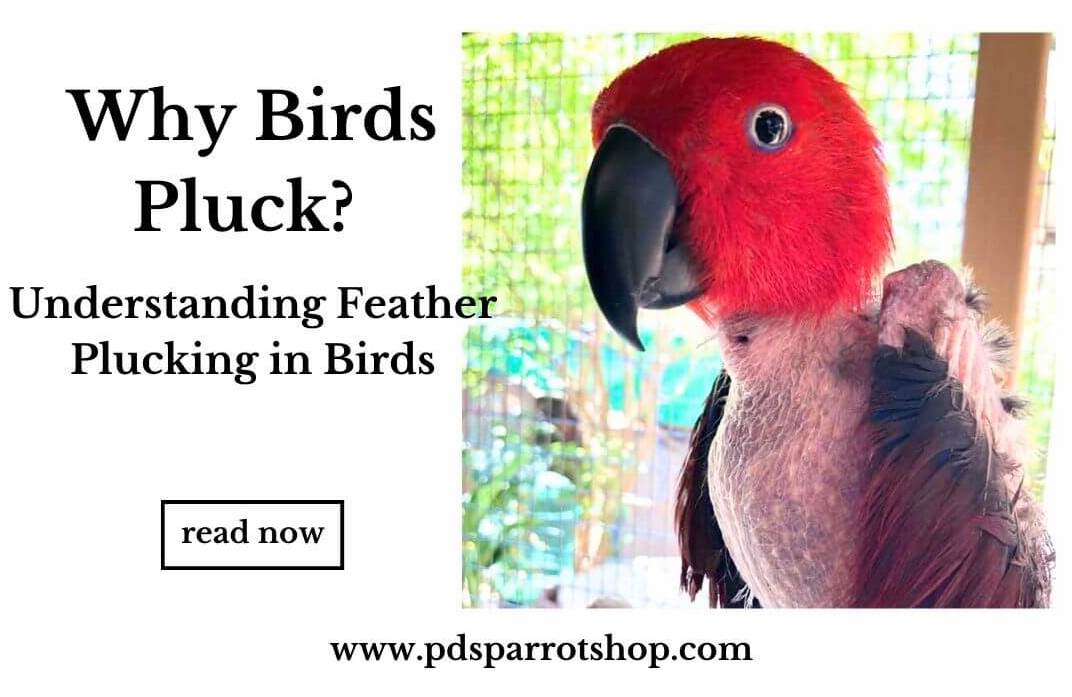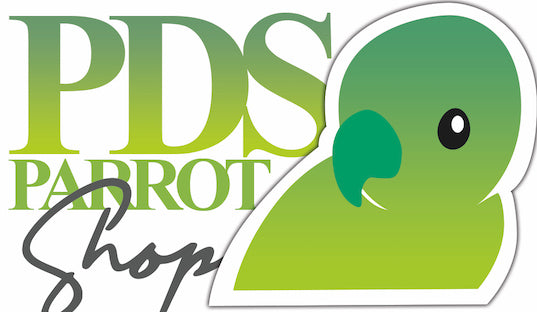
Understanding Feather Plucking in Birds
Share
Welcome to our comprehensive guide on feather plucking in birds. We are committed to providing valuable information to bird owners and enthusiasts. Feather plucking is a topic were you may never get an answer, but there a few steps you can take. In this article, we will explore the causes, prevention methods, and treatment options for feather plucking, a behavior that can significantly impact the health and well-being of our feathered companions.

What is Feather Plucking in Birds?
Feather plucking, also known as feather picking, is a behavior where birds excessively groom, chew, or pull out their own feathers. This behavior can range from mild feather destruction to severe cases where birds may completely strip their plumage, leading to potential skin damage and increased vulnerability to environmental stressors.

Understanding the Causes of Feather Plucking
Feather plucking can have various underlying causes, and it's crucial to identify and address them to effectively manage the behavior. Some common causes include:
-
Medical Issues: Certain medical conditions, such as skin infections, allergies, pain, hormonal imbalances, and nutritional deficiencies, can contribute to feather plucking in birds. It is essential to consult a qualified avian veterinarian to rule out any underlying health issues.
-
Environmental Factors: Birds are highly sensitive to their environment. Stressors like inadequate cage size, lack of mental stimulation, improper lighting, temperature extremes, and loud noises can trigger feather plucking. Providing a bird-friendly environment is crucial for their well-being.
-
Boredom and Lack of Enrichment: Birds are intelligent creatures that require mental stimulation and social interaction. A lack of toys, perches, and opportunities for exercise and play can lead to boredom and subsequent feather plucking as a coping mechanism.
-
Psychological Factors: Birds can develop psychological issues, such as anxiety, depression, or obsessive-compulsive disorders, which may manifest as feather plucking. Identifying and addressing these underlying psychological factors is essential for managing the behavior.

Prevention Strategies
Taking proactive measures to prevent feather plucking in birds is essential in promoting a healthy and contented bird. Here are some preventive strategies:
-
Proper Diet and Nutrition: Providing a balanced and species-appropriate diet is crucial for a bird's overall health. Consult an avian veterinarian to ensure your bird receives the appropriate nutrients and supplements necessary to maintain healthy feathers. Learn about the benefits of fresh foods for parrots.
-
Environmental Enrichment: Create a stimulating environment for your bird by offering a variety of toys, perches, and activities that encourage mental engagement and physical exercise. Rotate toys regularly to keep things interesting and provide opportunities for foraging.
-
Social Interaction: Birds are social creatures and thrive on social interaction. Spend quality time with your bird, engaging in activities such as training, playing, and talking. Consider introducing a same-species companion, if appropriate, to provide companionship.
-
Stress Reduction: Minimize stressors in your bird's environment by providing a quiet and peaceful living space. Ensure a proper cage size that allows for adequate movement and flight. Avoid exposing your bird to sudden loud noises or drastic temperature fluctuations.

Treatment Options for Feather plucking in Birds
Addressing feather plucking requires a multi-faceted approach tailored to the specific needs of your bird. Consultation with an avian veterinarian or an experienced avian behaviorist is crucial for an accurate diagnosis and effective treatment plan. Some common treatment options may include:
-
Medical Intervention: If an underlying medical condition is identified, appropriate treatment, such as medication, topical treatments for skin issues, or hormone therapy, may be prescribed by a veterinarian.
-
Behavior Modification: Behavioral techniques, including positive reinforcement training, environmental enrichment, and providing distractions, can help redirect the bird's focus away from feather plucking. Consult with an avian behaviorist for guidance on implementing effective behavior modification techniques.
-
Nutritional Supplements: If a nutritional deficiency is suspected, the veterinarian may recommend dietary supplements or changes to address the imbalance. Ensuring a well-balanced diet with the right mix of fresh foods, is essential for healthy feather growth.
-
Psychological Support: In cases where psychological factors contribute to feather plucking, the veterinarian or avian behaviorist may suggest strategies such as environmental modifications, increased social interaction, and the use of safe and appropriate calming techniques.

Feather plucking in birds is a complex issue that requires careful attention, patience, and a thorough understanding of the underlying causes. By implementing preventive strategies, seeking professional guidance, and providing a nurturing environment, you can help your feathered friend overcome feather plucking and promote their overall well-being. Remember, each bird is unique, and a tailored approach is necessary to address their specific needs. Together, we can ensure happier, healthier birds in our homes and aviaries. You may never find the reason for feather picking but this guideline will help to eliminate a medical or curable issues.

More Articles on Bird Health
Vitamin A Deficiency in Parrots
Toxic Respiration Hazards for pet birds
Vitamin D Deficiency In Our Pet Bird
Author: Monika Sangar and her friends who provided images of their parrots.
Co-founder of Prego Dalliance Sanctuary, Artisan of PDS Parrot Shop, Author of The Science of Avian Nutrition
Monika Sangar, the co-founder of Prego Dalliance Sanctuary, a 501c3 non-profit organization, uses these blogs to share her hands-on experience with parrots.
She is a designer and artisan at PDS Parrot Shop, and her craft can be viewed below. (click on logo)
PDS is a registered 501(c)3 nonprofit organization (tax id #46-2470926) PDS parrot shop makes parrot toys to help fund our sanctuary, Prego Dalliance sanctuary, 501c3, non-profit. www.pdsnonprofit.org

2 comments
I have a female Moluccan Cockatoo, age 23 almost 24 and has been a plucker most of her life. I have tried everything and had her checked out at the avian vet too. So, so hard with her diet. Thank you
This have been helpful. I’ve tried everything with my bird jackoo, he’s a rescue bird but still plucking